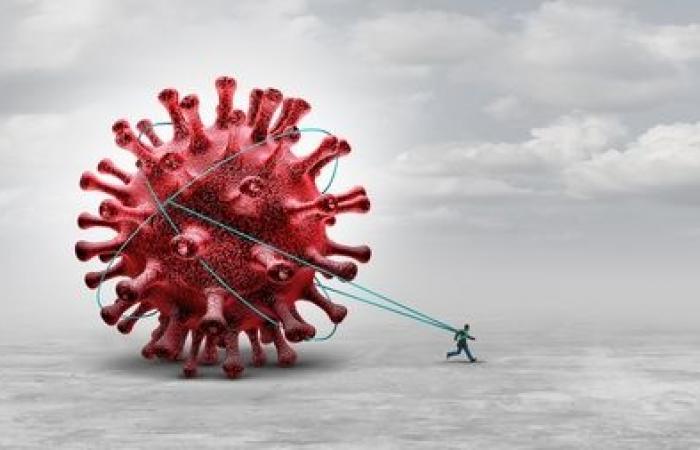Today, long Covid is a disease recognized by the WHO and, in France, by the High Authority for Health (HAS), even if research is still working to find the causes. “When you do an MRI, you don’t see anything. But just because we can’t see it doesn’t mean it doesn’t exist. From the moment there is a psychiatric symptom, anxiety, there is a biological correlate in the brain,” specifies François Chollet, professor of neurology at Toulouse University Hospital – Paul-Sabatier University, before noting that “many symptoms, such as dry eyes or skin problems, suggest a dysfunction of the autonomic, sympathetic or parasympathetic nervous system”. The latter is the keystone of emotion regulation at the level of the prefrontal cortex.
© FRANCE KEYSER/MYOP
There is a significant prevalence of depressive and anxiety disorders in people suffering from long Covid
In 2021, at the Timone hospital in Marseille, the team from the nuclear medicine department led by Éric Guedj evaluated the consumption of glucose in the brain by positron emission tomography in 35 patients with long Covid. The results showed hypometabolism: “This results in a decrease in brain activity, particularly in the olfactory bulb and the regions connected to it such as the limbic regions, linked to memory and the regulation of emotions; Thus as the brainstem which controls the body’s autonomous functioning, for example breathing or sleep. And also the cerebellum, which plays a role in motor skills and balance”explains Éric Guedj.
Results that “fit” with the list of symptoms listed by patients: fatigue, cough, shortness of breath, discomfort, loss or modification of smell and taste, loss of memory, cognitive dysfunction… They do not all suffer from the same ailments – and this is the particularity of the disease -, but everyone agrees that their quality of life is impacted.
At the top of the long list, the triptych: exercise intolerance, fatigue and cognitive disorders. The latter two are key symptoms of depression. “There is a significant prevalence of depressive and anxiety disorders among people who suffer from long Covid. A meta-analysis estimates this prevalence at 25% in patients with long Covid without having been hospitalized for a severe form,” explains Cédric Lemogne, psychiatrist specializing in the relationships between psychological factors and physical health, at the Hôtel-Dieu hospital in Paris (AP-HP/Inserm/Paris Cité University).
An associated symptom
These figures, two to three times higher than those observed in the general population, for a time suggested a direct depressogenic effect of the virus which would affect the brain. A hypothesis questioned by Cédric Lemogne: “There are epidemiological data which do not completely point in this direction. At the start of the pandemic, depression and anxiety increased very quickly in the population, while there were still very few people infected [l’OMS estime que les troubles dépressifs majeurs ont augmenté dans le monde de 27,6 %, lors de la première année, et de 25,6 % pour les troubles anxieux, NDLR ]. Conversely, when infections subsequently exploded, levels of anxiety and depression tended to improve or stagnate.”
The cause of these disorders would therefore rather be sought elsewhere, in the uncertainty concerning the origin, evolution and treatment of physical symptoms, as well as the associated handicap and the lack of recognition from which patients suffer. A study conducted by psychiatrist Sarah Tebeka for Public Health France revealed that the number of patients with the diagnostic criteria for long Covid solely for “depressive symptoms” is anecdotal. Depression is therefore probably more of a symptom associated with long Covid than a symptom of the latter. In other words, patients who present with depressive symptoms also present other symptoms attributable to long Covid, while the opposite is not true.
3% of people surveyed (on loss of smell linked to Covid-19) were ready to consider brain surgery
On the other hand, a history of anxiety or depression is an established risk factor for developing persistent symptoms after infection with Covid-19, as shown by Cédric Lemogne in a study published in July 2023 in the journal Molecular Psychiatryand carried out in the Constances cohort, an epidemiological research project made up of 220,000 volunteers.
Psychological support
The care of patients is today defined by the HAS, and graded: consultation with the general practitioner, initially; then, secondly, a multidisciplinary consultation in “long Covid” reference centers integrating mental health. “We have conducted several online surveys on the symptoms and needs of people affected by Covid-19, to assess the impact on quality of life, explains Moustafa Bensafi, research director at the neuroscience research center at Claude-Bernard Lyon-1 University. In the last one, published this year in Communications Medicine, in a cohort of 639 people, 50% reported an olfactory, taste, gastrointestinal or flu disorder, 75% of people considered their olfactory loss to be disabling, and the same was true for 90% of people complaining of cognitive symptoms. and 63% of people affected by gastrointestinal symptoms. In terms of needs, they expressed the desire to be psychologically supported, even at a professional level. Regarding loss of smell, 3% of those surveyed on the subject were willing to consider brain surgery.” But perhaps there is no need to consider such extremes. François Chollet would like to reassure: “It can last a long time, but it’s important to say that patients eventually get better.”
© PATRICK ALLARD/REA
© TESSON/ANDIA.FR
On April 29, 2024, Inserm and the health services and policies research unit (Eceve) launched a vast national study on the mental well-being of 11 to 24 year olds.
Code name: Mentalo. This project aims to assess the deterioration in the mental health of young people who, in particular, experienced the Covid years. It will take the form of an online questionnaire, accessible via an application with confidential and secure data. A sample of 50,000 young people will be “recruited” by the end of 2024, and their responses collected until 2026 before being studied.
© GEORGES ROBERT/LA PROVENCE/ PHOTOPQR/ MAXPPP
In March 2020, hundreds of people suddenly lost their sense of taste and smell and their meals suddenly took on “a cardboard taste”. Anosmia and ageusia – the loss of smell and taste – have quickly become recognizable symptoms of a Covid infection. However, when this powerful chemo-sensory machine composed of the olfactory system, the trigeminal system (which allows us to analyze whether a food is salty, sweet, bitter, acidic, astringent, etc.) and the gustatory system breaks down, it is the entire sensitive balance of the individual who is affected. “They are all three essential, because they have an alert function to warn us of danger by detecting odors of smoke, gas, overheated or spoiled food; or by detecting possible poisons”, explains Moustafa Bensafi, research director at the Neuroscience Center at Claude-Bernard University, in Lyon. Without smell and taste, we become vulnerable, but we also lose a hedonic, emotional function. Smell is there to give us pleasure through food, the scent of flowers, the smells of loved ones… it is a source of well-being, activation of memories and social interactions.
“This loss can really induce very strong anxiety or stress, so much so that a third of patientsaffected will develop symptoms that strongly resemble depression”continues the researcher who has been working on dysosmia for thirty years. Among the treatments being considered: the Orion project, which optimizes olfactory training protocols via a digital platform.
Moustafa Bensafi is also leading the European Rose project, the aim of which is to create an artificial nose using miniaturized odor sensors and neural stimulators… A non-invasive prosthesis that should give a “nose” back to those who have lost it.






